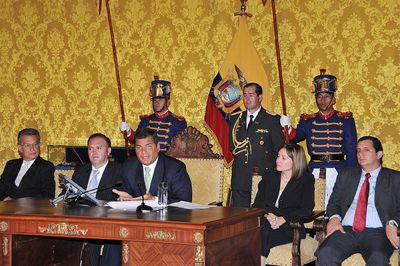Finding ways to improve the nation's economy has been one of the Ecuadorian government's main concerns over the past year. With the increase in the price of gasoline, there is even more pressure to create jobs and provide relief to those most affected by the crisis. President Rafael Correa presented a proposal called Economic Measures for Production and Employment [es] (.pdf format). This new proposal will make changes in the Equity Tax Reform and aims to make 5 essential changes [es].
Among these changes are an increase of tax on foreign currency exchange outflows from 1% to 2%, taxation on the profits from shareholder dividends, a minimum tax on companies that use public infrastructure, changing the way that taxes on cigarettes, alcoholic beverages and soft drinks are calculated, and a 12% Value Added Tax on paper imports.

At press conference announcing the tax measures by the Ecuadorian Presidency and used under a Creative Commons license.
Carlos Guzmán L. of the blog Foro Politécnico [es] is one who supports the President's decision to introduce tax changes, and the changes support a statement that President Correa said earlier this year [es], when he said, “Forget it, in this Government, the bankers do not give orders. They gave orders up until January 15, 2007,” which is the date that Correa took office. Guzmán writes:
Como un ejemplo más de las falacias con que nos hicieron vivir durante la larga, triste y miserable noche neoliberal, los áulicos del sistema glorificaron a Elsa de Mena y su supuesta “reforma tributaria” que organizó al SRI, automatizó procesos, mejoró recaudaciones y expandió la base tributaria. Lo que nunca dijeron, fue que esta dama de triste recordación se convirtió en la gran protectora de los grandes empresarios y oligarcas del país, privilegiando la recaudación de los impuestos indirectos –como el IVA o el ICE- y “olvidando” la recaudación de los impuestos directos como el Impuesto a la Renta.
While some people may overlook the tax increases on the export of paper, Enrique Abad of the Ecuadorian Association of Librarians thinks that the government is taking the wrong approach. He adds that the tax increase will negatively affect science and technology in the country. He comments on the story from the official government newspaper [es]:
Para invertir en Ciencia y Tecnología se necesita investigación, y como su insumo, información. Las fuentes de información científicas en su mayoría las adquirimos en el extranjero, el incremento del impuesto a la expatriación de capitales encarece el acceso a estas fuentes. ¿Se podrá hacer una distinción en ésto?
Los resultados de investigación generalmente se difunden en revistas científicas, en formato papel y electrónico. Lamentablemente el incremento del papel para la impresión de revistas afectará a las primeras. Me parece que esta es una medida “política” desatinada ¿Qué tal si mañana “las revistas” en vez de imprimirse en papel couche se imprimen en papel bond?¿Se elevará el precio del papel bond y con ello también la de los libros? !vaya si nos gusta meternos en camisas de once varas!
To invest in science and technology, research is needed, and as its input, information. The sources of scientific information are acquired mostly from abroad, the tax increase to capital expatriation makes it more expensive to access these sources. Will it be possible make a distinction on this?
The research results generally are disseminated in scientific journals, in paper and electronic formats. Unfortunately, the cost increase for the printing of magazines will affect research presentations. I think this is a mindless “political” measure. What would happen if tomorrow the magazines are instead of printed on couche paper, are printed on bond paper? Will it be the price of bond paper increase and with that also the price of book? How we like to get ourselves in hot water!
However, Clara Lucía Placencia of the blog People on Earth [es], does not think that these new measures will curb tax evasion. On the contrary, she believes that the taxation on shareholders will mean that they will be taxed twice [es]. Another economics blogger, Andrés Freire, who is the Director of the Business Promotion Office in Guayaquil, writes that the new taxes will not help with the creation of jobs because there will not be an incentive to open new businesses, thus concentrating the money in a few productive economic sectors. However, Freire does agree with the 12% taxation on paper imports because it is time for them to pay the VAT. He also notes that only medicine and food are exempt from taxes.
Politicians are also taking to online media to pass along their thoughts on the tax measures. Luís Villacís Maldonado, member of the National Assembly and the National Director of the Popular Democratic Movement political party, writes that the President must look at other measures, not necessarily monetary ones [es], to help alleviate the crisis. He also agrees with groups that say that the 12% tax on paper imports will affect education and raise costs of books and magazines. He describes a way to help the economy:
[recuperar] los Recursos Naturales no renovables como el petróleo todavía en manos transnacionales lo cual significaría 2000 millones de dólares al año, un cobro efectivo a los grandes evasores hasta ahora no tocados que perjudican al estado anualmente con 2000 millones de dólares. Además del fortalecimiento de la banca pública para la inversión pública y comunitaria, cumpliendo el artículo 299 de la Constitución de la República que manda que los recursos públicos se manejen en la banca pública y no privada donde se retienen 1100 millones de dólares.






